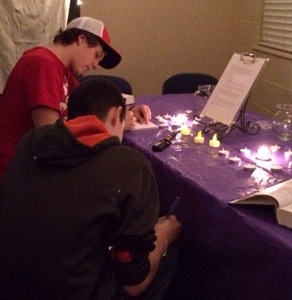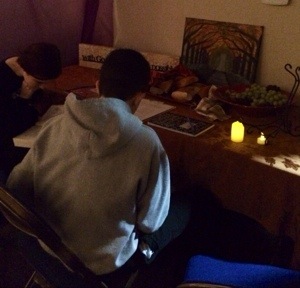This week I retreated to a camp in Glen Rose, Texas, for three days of spiritual retreat. Going on a minimum 3 day spiritual retreat is a requirement for my ordination in the United Methodist Church. I had a lot of flexibility on how the retreat itself would go.

Inspired by the TED Talk I heard from “planet walker” John Francis, I decided to incorporate silence and not using a vehicle as part of my retreat.

Two things I learned in the process:
1. It is relatively easy to be silent when you’re by yourself, but it is a challenge to be around people without feeling pressured to say something. For most of my time away, I was on the camp by myself. I went for a long walks, I hiked through the forest, I spent time creating art and reading. I was quiet.
In the silence, I was able to rest. I was able to just be, just listen. I noticed things I might have overlooked – the smell of dew in the morning, the sound of deer as they scamper away, even the sound of a bird’s wings flapping. I ate when I was hungry and slept when I was tired.
On the few occasions I walked in to town, people were friendly and I felt compelled to speak. The person I talked to the longest, an elderly man in an antique store, seemed lonely. While a vow of silence seems like a noble idea, sometimes small talk is a compassionate act.
2. Sometimes I have to consciously choose to feel safe. One of the hardest parts about being by myself, especially as a petite female, was getting over feeling anxious about possible dangers. I had to let that fear go in order to feel at peace. The fears of unknown dangers, especially while walking alone at night in the dark, cluttered up my thoughts.
Once I made the conscious choice that I was going to feel safe, I could enjoy nature fully. I was able to pray and sing like no one could hear me. It was only then that I could fully experience God’s presence.
I think it’s worth mentioning that living in a culture that feels dangerous even if the dangers are not real makes spirituality more difficult. When I walk alone at night, a part of my brain is constantly on the lookout for possible attacks, alert for sudden movements around the corner. I cannot be the only woman who feels this way. It’s a bit heartbreaking to have to choose to feel safe. My hope is that by mentioning it we can all work together for more peace, working to create a culture of safety. (Maybe you were expecting me to learn something more profound, and I did learn other things – I spent a lot of time reading, studying, writing and creating. There will be more blog posts to come.)
“for God gave us a spirit not of fear but of power and love and self-control. ” 2 Timothy 1:7















